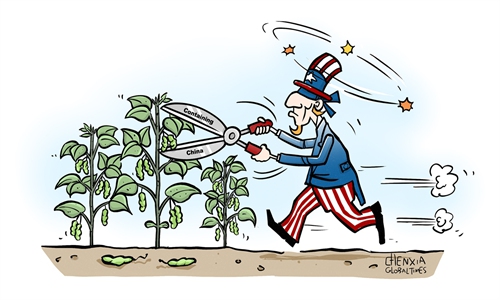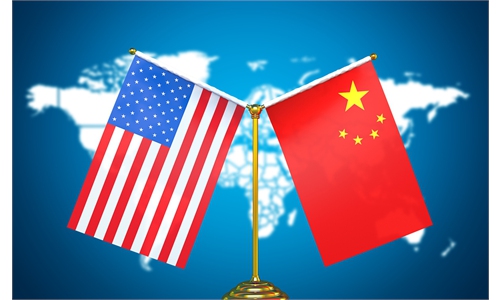
Illustration: Liu Xiangya/Global Times
The Financial Times Chinese edition published an op-ed piece recently saying that stalled trade agendas are pushing some senior American trade officials out the door, but the flurry of resignations won't get US trade policy out of its predicament. We worry that Washington's inaction to promote trade facilitation may cast shadows over global trade.Frustration with a stalled trade agenda and unhappiness with the leadership of US President Joe Biden's trade chief is pushing more than a half-dozen senior trade officials out the door, according to a report by Politico.com.
The wave of resignations comes after the US trade agenda ran aground on multiple fronts in 2023. Washington failed to reach a green steel and aluminum deal with the EU and pulled out of trade talks that were part of the US-crafted Indo-Pacific Economic Framework (IPEF) in November, according to Politico.com.
Reuters said in a report that the top US trade official for Asia, Sarah Bianchi, stepped down in January, as the US Trade Representative's office plots its next moves on IPEF talks after failing to reach a deal in 2023.
A free trade agreement (FTA) is designed to reduce barriers to imports and exports between countries by eliminating all or most tariffs, quotas, subsidies and prohibitions. However, the US views the global economy with a zero-sum mindset, and it tries to use FTAs as a tool to establish geopolitical alliances, or a US-centered cliques serving only US national interests.
In particular, the US is increasingly seeing China as a competitor, or even a "hypothetical enemy" rather than an economic partner. This has led US trade policy to deviate from the right track.
Against this backdrop, it is difficult for the US to make significant progress in FTA talks. If some progress can still be made, then it will come from political and economic coercion by the US against its allies, rather than a desire to promote mutually beneficial cooperation. Many countries hope they can further enter the consumer market in the US through FTA talks, but almost every attempt has ended in failure.
The US was once a leader of global free trade, but now, frustration with stalled trade agendas spreads like a bad cold. Washington needs to find a scapegoat for its failed trade policy. This may partially explain why there is a flurry of resignations. However, these resignations have not pushed Washington to reflect on its trade policy and get it back on the right track. On the contrary, this may lead to greater chaos.
Under the pressure of stalled trade agendas as well as the flurry of resignations, the administration is likely to appoint more-hawkish officials to fill vacant positions. The US is expected to deviate from the route of free trade and globalization, and go further down the wrong path of seeking decoupling by forming cliques and small circles on the international stage.
This will cause greater harm to the global trade system. WTO Director-General Ngozi Okonjo-Iweala was quoted by Nikkei Asia in October as saying that the global economy has not embraced decoupling but is showing signs of fragmentation, which would be "very costly" for all.
For a long time, the US led the world as a staunch supporter of free trade. Clearly, the US has abandoned that role. In the long run, this will weaken, rather than enhance, the position of the US in the global industrial chain.
We hope the wave of resignations in the US won't result in more hawkish US foreign and trade policies, which will further disrupt supply chains in the US and around the world. However, if it becomes reality, other countries, including China, should be prepared for irrational US policies.
China has always upheld the multilateral trading system and promoted free trade arrangements. China's policymakers have stressed efforts to actively participate in the reform of the WTO and improve the ability to promote high-level opening-up. This constitutes a sharp contrast with what the US has been doing.
China's consumption growth is making it an increasingly important consumer market in the world, which will partially offset the impact of US trade protectionism on the global economy. At the same time, China is seeking to extend its manufacturing industry chain and explore markets in developing countries for its cost-effective manufactured products. As a result, this will strengthen mutually beneficial cooperation between China and developing economies.
China is committed to strengthening communication with the US and other Western countries on trade issues. A complete trade decoupling between China and the US is unlikely. Hopefully, policymakers in the US can recognize this and reflect on the country's trade policies.
The author is a reporter with the Global Times. bizopinion@globaltimes.com.cn



